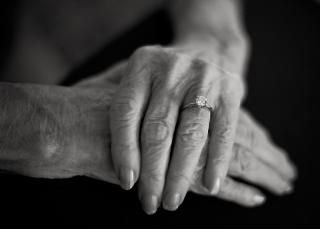Mutual Mothering

For decades prior to my mother’s diagnosis of Alzheimer’s, we had suffered a strained relationship born from her alcoholism. When I learned she had Alzheimer’s, my hope for forgiveness and reconciliation drained away, along with her cognitive abilities.
But the world of Alzheimer’s teems with surprises. As Mom’s disease progressed, the ways I had disappointed her disappeared from her consciousness, and our struggles effortlessly ended. In her “now,” I was her kind, loving companion. My faithful presence was all that mattered to her; for the first time in my life, I felt wholeheartedly accepted by my mom—just exactly as I am. The wounds from the past began to heal in the arms of a mother who loved me in the present.
For our relationship to heal, my acceptance of Mom was also essential. Having learned about Alzheimer’s process of decline, I let go of expecting Mom to be the mother I had always wanted, and embraced the mother she now was. After doing this, in many ways she became the mother I needed.
Since I didn’t expect, demand, or want Mom to be anyone other than who she was, she became the one person who could never disappoint me. I gratefully received whatever she offered, not asking for more. I realized just how much Mom was still able to give—including important things a daughter needs from her mother. For example, I trusted that she would be available to me whenever I was sad or stressed and needed a hug. She was always happy to see me, and she let me know that I was appreciated—through looks, smiles, touches, and sounds.
Perhaps Mom lacked the ability to intentionally mother me in these ways, but I received the experience of being mothered nonetheless. Sometimes I actually sat on her lap like her little girl. Although I’m petite and Mom was quite robust at the time, I kept one foot on the floor, holding most of my weight off of her. I also used this foot to slowly rock her wheelchair. As Mom held me tightly, I imitated the voice of her baby doll, softly saying, “Mama, Mama.” I believed these words brought her comfort. I also believed that if Mom could speak, she would be saying, “Mama, Mama” to me. I’m not sure which one of us was healed more by what felt like an experience of mutual mothering.
Although Alzheimer’s was the catalyst for the changes within us and the connection between us, this didn’t make our love for each other less real or less profound. What Mom gave to me, and what Mom received from me, created an unbreakable bond and actualized a transformative love story that will be mine for the rest of my life.
| Date added | |
|---|---|
| Tagged as |